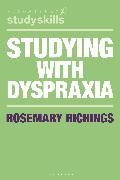Read more
Full of practical guidance, Studying with Dyspraxia helps readers to understand what to expect at university and gives support in adjusting to a more independent lifestyle. Crucially, it helps students to implement study strategies that really work. This book gives students the knowledge, tools and confidence to thrive at university. Students will gain a more in-depth understanding of what reasonable adjustments could be available to them, and how they can benefit from them. They will also learn how to articulate their needs to university professionals and teaching staff. A core objective of the book is to help students become effective self-advocates: people who effectively communicate their needs and make decisions based on their needs and interests. In addition, the book contains valuable guidance on how to avoid low motor pain when studying. The text ends with a chapter on life after university, which is designed to encourage readers to think about their options and to reflect on their challenges and successes. It also gives advice on applying for jobs. This valuable resource will encourage readers to make choices in their personal and professional lives that positively affect their experiences at university.
List of contents
Chapter 1: Understanding Neurodiversity, Neurodivergence and Dyspraxia
Chapter 2: Connecting With Like-Minded Peers
Chapter 3: Disabled Student Support Services
Chapter 4: Communicating With Your Lecturers
Chapter 5: Getting A Diagnosis
Chapter 6: Managing Your Energy
Chapter 7: Time Management
Chapter 8: Finding (Realistic) Independence In Your Life
Chapter 9: Motor Tone and Muscular Pain Management
Chapter 10: Learning and Retaining Information
Chapter 11: Public Speaking as A Neurodivergent Person
Chapter 12: Working With Your Peers
Chapter 13: Reasonable Adjustments: Assignments and Notetaking
Chapter 14: Exams and Reasonable Adjustments
Chapter 15: Preparing For Your Exams
Chapter 16: Having The Best Possible Exam Day
Chapter 17: What Might Your Life After University Look Like?
Additional Dyspraxia Resources You Need to Know About
Glossary
About the author
Rosemary Richings is a writer, editor and public speaker, specialising in disability and neurodiversity-related subjects.

